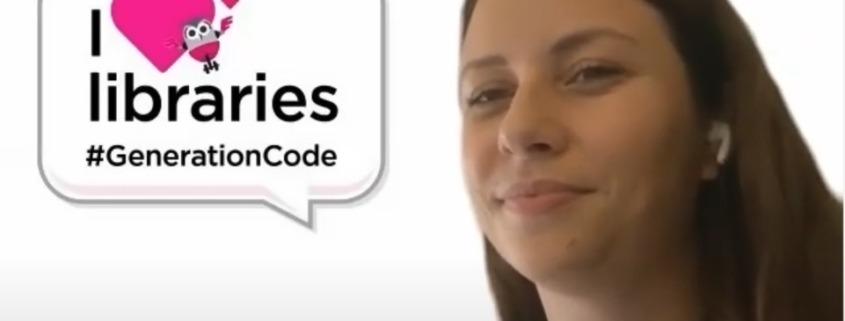As part of the interactive event “Generation Code: Born in the Library”, Irena Joveva spoke with Maja Vunšek from the Kranj City Library, who recently joined the EU initiative Public Libraries 2030. The library was included in the group of innovative public libraries in Europe “Lighthouse Libraries”. Project “Public Libraries 2030” brings together public library advocates among MEPs, called MEP Library Lovers. Irena Joveva answered questions on topics at European Union level; on the work during the pandemic, the priorities of the EU Recovery and Resilience Facility her work a member of the Committee on Culture and the importance of public libraries.
As Joveva explained in the introduction, the pandemic had utterly destroyed the established work patterns in the European Parliament. However, once the online meeting platform was properly set up, teleworking became almost uninterrupted, allowing us to work in our full potential. She is in regular contact with her colleagues, although she has not travelled to Brussels since the beginning of the pandemic. But being in Brussels does not necessarily mean being in the meeting room. “Most participants also use teleworking techniques in Brussels. At this point, it seems we have created new normal working conditions that could be used in the future when the corona crisis passes,” she added.
She agrees that the “Next Generation EU” recovery package will play a vital role in the EU’s recovery. Its primary purpose is to support the Member States in recovering from the crisis and boosting the economy, as well as to help private investments and ensure greater stability in the future, should such an event as this pandemic reoccur. Managing the economic and health crisis, together with digital development and tackling climate change, will be a priority, helping Europe to achieve its important goal of becoming the world’s first carbon-neutral continent. She added: “I am pleased that the President of the European Commission, Ursula von der Leyen, supports the European Parliament’s position on the rule of law mechanism for funds allocated to each Member State as a safeguard against exploitation and misuse.” In the current proposal, she regrets the low involvement of culture and the lack of plans for housing policy and youth employment. Unfortunately, the draft proposal for a multiannual financial framework also reduces funding for important youth and cultural programs, such as Erasmus Plus, which is why Joveva, together with like-minded MEPs, is strongly committed to trying to ensure much-needed funding.
She is a very active member of the Committee on Culture and Education:
“My main priorities in the committee are youth, education, culture, media freedom and digitalisation related to the development of artificial intelligence and sport. I am currently working on a European Solidarity Corps dossier. It is a European Union initiative that creates opportunities for young people to volunteer or to participate in projects across Europe. It gives them a great opportunity for several activities that allow them to gain work experience and represent a great stepping stone in career opportunities.”
Europe’s main priorities for the coming years are the fight against climate change and digitalisation. She sees the role of libraries in the context of education: “Libraries could make a significant contribution to educating people by organising seminars and workshops, helping them to understand how they, as individuals, can contribute to our common European goal. Moreover, educating the older generations on how to use new technologies successfully will be crucial.”
At the end of the interview, she spoke about her views on the importance of libraries in Slovenian politics: “Of course, politicians are aware of the importance and the potential of public libraries, but how much they engage them in their policies, and their work as such, is a completely different question.” She stressed that the lack of emphasising the importance of public libraries is directly correlated to the lack of highlighting the meaning of culture in Slovenia’s public. It’s the result of the inactivity of the Slovenian Minister of Culture, who does not point out the problems in the field of culture, reflecting in the late responses or even non-response to the issues. Adding that in her opinion, education and culture need to cooperate in raising reading culture in Slovenia: “Promoting reading through mechanisms such as ‘the reading badge’ is undoubtedly welcome, but I believe that the main actors in the field of education and culture should come together and develop a strategy for increasing reading culture and library visits.” Finally, she listed some ideas that could make libraries more attractive to visitors and highlighted the need to keep up with the digital development by increasing the supply of digital materials and books.
A recording of the conversation, which – with the exception of the last question and the answer to it – was conducted in English, can be viewed HERE.




Leave a Reply
Want to join the discussion?Feel free to contribute!